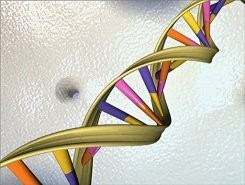Scientists see gene trigger for rare childhood baldness
15 Apr 2010, by in HAIR LOSS HEALTH NEWSScientists said on Wednesday they had uncovered a gene that causes a rare but distressing form of childhood baldness, a finding that could help the quest to treat hair loss.

Scientists see gene trigger for rare childhood baldness
Mutation in a gene called APCDD1 plays a key role in a disease called hereditary hypotrichosis simplex (HHS), which causes progressive hair loss starting in childhood.
Hair follicles start to shrink or narrow, causing the thick hair on the scalp to be replaced by “peach fuzz” of thin, fine hair.
APCDD1, which is located on Chromosome 18, was found thanks to a trawl through the genome of several families from Pakistan and Italy where HHS goes back generations.
Lead author Angela Christiano, a professor of dermatology at Columbia University Medical Center, New York, dampened expectations for bald men hoping that a drug for hair regrowth now lies in sight.
Male pattern baldness also entails follicular shrinkage, but the process is more complex and not directly comparable to HHS, she said.
Even so, the new finding is “highly significant” in terms of fundamental research, said Christiano.
Among people with HSS, a flawed version of APCDD1 disrupts a signalling pathway in which genes instruct proteins to turn hair growth on or off.
This so-called Wnt pathway has been extensively explored in lab mice, so finding that it also exists among humans is an important step forward in figuring out the causes of baldness.
“Furthermore, these findings suggest that manipulating the Wnt pathway may have an effect on hair follicle growth — for the first time, in humans,” said Christiano.
“And unlike commonly available treatments for hair loss that involve blocking hormonal pathways, treatments involving the Wnt pathway would be non-hormonal.”
The paper appears in the British science journal Nature.
Do you have Hair Loss Problems, read our Hair Loss Help






Sorry, the comment form is closed at this time.